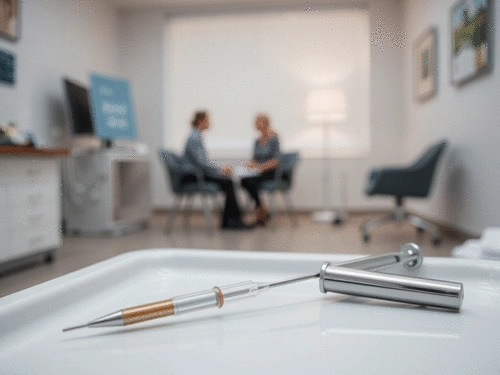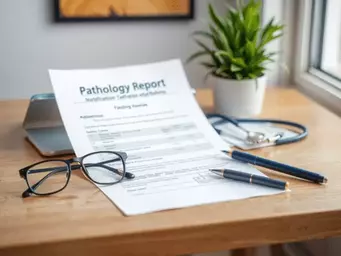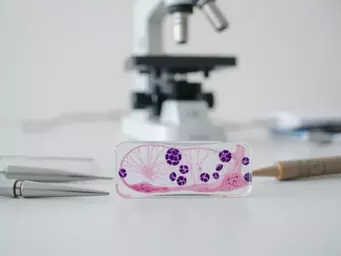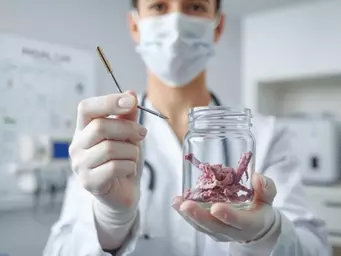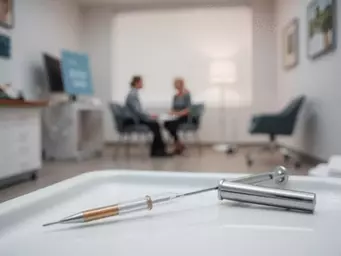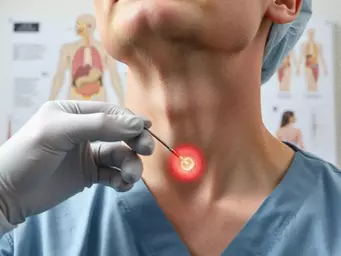Feeling apprehensive about your upcoming needle biopsy? You're not alone. Many share the same feelings of uncertainty when facing medical procedures. Understanding the details of this common process can help ease your worries and empower you to take control of your healthcare journey.
What You Will Learn
- A needle biopsy is a less invasive method for obtaining tissue samples that can diagnose conditions like cancer and infections.
- There are two main types of needle biopsies: fine-needle aspiration (FNA) and core needle biopsy, each suited for different diagnostic needs.
- Preparation is key; knowing fasting and medication guidelines can ensure a smoother procedure.
- Understanding potential biopsy indications, such as suspicious masses or unexplained symptoms, highlights the procedure's significance in your healthcare journey.
Needle Biopsy Procedure: Key Stages and Indications
Understanding the needle biopsy process can empower you to face the procedure with more confidence. Below is a visual representation of the key stages and common indications for a needle biopsy.
Needle Biopsy Types
- Fine-Needle Aspiration (FNA): Uses thin needle for small samples.
- Core Needle Biopsy: Employs larger needle for bigger tissue samples.
Common Indications
- Suspicious lumps/masses: Confirm benign or malignant nature.
- Unexplained symptoms: Identify underlying issues (e.g., pain, weight loss).
- Monitoring existing conditions: Track disease progression over time.
Preparation Steps Overview
Fasting Guidelines Medication Adjustments Ask Questions Download Checklist
Understanding the Needle Biopsy Procedure
When you hear the term needle biopsy, it may sound intimidating, but it’s a common and important procedure that can provide crucial insights into your health. Essentially, a needle biopsy involves using a thin needle to extract a small sample of tissue from a specific area of your body. This sample is then analyzed in a lab to help diagnose or rule out various medical conditions. For more detailed information on needle biopsies, you can consult resources like the Mayo Clinic's overview of needle biopsies.
Needle biopsies are performed for a variety of reasons, often when further investigation is needed based on imaging scans or physical examinations. They’re a less invasive option compared to surgical biopsies, which can lead to quicker recovery times and less discomfort. Understanding why and how this procedure is performed can significantly reduce anxiety, and my goal is to help you navigate this experience with confidence.
What is a Needle Biopsy and Why is it Performed?
A needle biopsy is a procedure designed to obtain a tissue sample using a fine or core needle. This technique allows for the collection of cellular material that can assist in diagnosing conditions such as cancer, infections, or inflammatory diseases. There are two primary types of needle biopsies: fine-needle aspiration (FNA) and core needle biopsy, each serving different diagnostic purposes. The Mayo Clinic also provides in-depth information about various biopsy types, including those used for cancer diagnosis.
- Fine-needle aspiration (FNA) uses a very thin needle to withdraw a small sample.
- Core needle biopsy employs a larger needle to extract a bigger tissue sample, allowing for more comprehensive analysis.
By performing a needle biopsy, your healthcare team can make informed decisions about your treatment options. It’s a step towards clarity and reassurance, and knowing what to expect can help ease your mind.

The Importance of Knowing What to Expect
Feeling anxious about your biopsy? You’re not alone. Understanding the needle biopsy process can empower you to face the procedure with more confidence. Knowing what to expect during the procedure, including how long it will take and whether you will experience any discomfort, helps demystify the process. For instance, a breast biopsy often involves similar preparatory steps and considerations, providing a good example of what to anticipate.
Typically, the biopsy will take less than an hour, and the actual needle insertion only lasts a few moments. While some people may feel a slight pinch or pressure, this is usually tolerable. I encourage you to communicate openly with your healthcare provider; they can explain each step to you to further alleviate any concerns.
Common Biopsy Indications and Their Significance
Needle biopsies are performed for several reasons, and understanding these indications can help you grasp the importance of this procedure. Here are some common reasons for a needle biopsy:
- Suspicious lumps or masses: When imaging tests indicate an abnormality, a biopsy can confirm whether these are benign or malignant.
- Unexplained symptoms: If you have symptoms like unexplained weight loss or persistent pain, a biopsy may help identify underlying issues.
- Monitoring existing conditions: In some cases, biopsies are used to monitor diseases such as cancer over time.
By recognizing the significance of the biopsy results, you can appreciate the critical role this procedure plays in your healthcare journey. It’s all about gathering essential information that will guide your treatment options!
Preparation Steps Before Your Needle Biopsy
Preparing for your needle biopsy is crucial for ensuring a smooth and successful procedure. Proper preparation can make a significant difference in your experience and outcomes. Let's explore the essential steps you should take before your biopsy.
Essential Fasting and Medication Guidelines
Before your needle biopsy, your healthcare provider will likely give you specific instructions regarding fasting and any medications you should adjust. These guidelines are important for your safety and the effectiveness of the procedure.
- Fasting: You may be instructed to fast for several hours before the procedure, especially if sedation is planned.
- Medication adjustments: Certain medications may need to be paused or adjusted, particularly blood thinners.
Following these guidelines can help prepare your body for the procedure, ensuring that everything goes as smoothly as possible.

We Want to Hear From You!
How do you feel about the needle biopsy process? Share your thoughts and experiences with us:
Frequently Asked Questions About Needle Biopsies
- Q: What is a needle biopsy?
- A: A needle biopsy is a medical procedure that uses a thin needle to extract a small tissue sample from a specific area of the body for laboratory analysis. It's used to diagnose or rule out various medical conditions, including cancer, infections, and inflammatory diseases.
- Q: What are the main types of needle biopsies?
- A: The two primary types are Fine-Needle Aspiration (FNA), which uses a very thin needle for small samples, and Core Needle Biopsy, which uses a larger needle to extract bigger tissue samples for more comprehensive analysis.
- Q: Why is a needle biopsy performed?
- A: Needle biopsies are performed for several reasons, such as investigating suspicious lumps or masses found in imaging tests, identifying the cause of unexplained symptoms (like persistent pain or weight loss), and monitoring the progression of existing conditions like cancer.
- Q: Will I feel pain during the needle biopsy?
- A: Most people experience only mild discomfort during a needle biopsy because local anesthesia is typically used to numb the area. You might feel a slight pinch or pressure, but significant pain is uncommon.
- Q: What preparations are needed before a needle biopsy?
- A: Preparations often include fasting for several hours before the procedure (especially if sedation is planned) and adjusting certain medications, particularly blood thinners, as advised by your healthcare provider. It's important to follow all instructions given by your doctor.
Summarizing Key Insights and Next Steps
As we wrap up our exploration of the needle biopsy procedure, it’s important to highlight key insights that can help you feel more prepared. Understanding the process, the reasons behind it, and what to expect can make a significant difference in reducing anxiety. Remember, knowledge is power! Here are some common questions and myths that I often hear about needle biopsies:
- Will I feel pain during the procedure? Most people experience only mild discomfort, as local anesthesia is used.
- Is a needle biopsy the same as surgery? No, a needle biopsy is less invasive and generally has a shorter recovery time.
- Can a needle biopsy provide accurate results? Absolutely! It’s a reliable method for obtaining tissue samples.
These clarifications can help dispel some of the worries surrounding the procedure. If you have more questions, don’t hesitate to reach out!
Downloadable Checklist for Biopsy Preparation
To further assist you, I've created a downloadable checklist that outlines important steps to take before your biopsy. This guide covers essential preparations, including:
- Fasting and medication guidelines
- Questions to ask your healthcare provider
- What to bring on the day of your biopsy
Having this checklist handy will ensure you’re fully prepared and organized. You can find it on our website, What Is A Biopsy. Just click the link and download your copy!
Encouragement and Support Resources
It's completely normal to feel a bit anxious before your biopsy. Remember, you’re not alone in this journey! There are numerous resources available to support you during this time. Here’s where you can find more information and help:
Where to Find More Information and Help
For additional resources, consider visiting trusted organizations such as:
- The American Cancer Society
- National Institutes of Health (NIH)
- Your local hospital’s patient education center
These organizations offer valuable information that can help you understand the procedure better and connect you with healthcare professionals.
Connecting with Patient Support Communities
Sometimes, it’s comforting to talk to others who have gone through similar experiences. There are many patient support communities available, both online and in-person. Here are a few options:
- Support groups through local hospitals
- Online forums like Cancer Support Community
- Social media groups focused on patient experiences
Connecting with others can provide a sense of camaraderie and reassurance. You’ll find that sharing experiences can be incredibly uplifting!
Understanding Patient Rights and Health Insurance Coverage
It's crucial to know your rights as a patient and understand your health insurance coverage when it comes to procedures like needle biopsies. Make sure you:
- Review your health insurance policy for coverage details
- Ask your healthcare provider about costs and payment plans
- Know your rights regarding informed consent and privacy
Being well-informed about these aspects will empower you to take control of your healthcare journey. Remember, my mission at What Is A Biopsy is to provide you with clear and compassionate information so you can navigate these processes with confidence.
Recap of Key Points
Here is a quick recap of the important points discussed in the article:
- A needle biopsy is a minimally invasive procedure used to obtain tissue samples for diagnosis.
- Understanding the procedure can help reduce anxiety and empower patients.
- Common reasons for a biopsy include suspicious lumps, unexplained symptoms, and monitoring existing conditions.
- Preparation is crucial; follow fasting and medication guidelines provided by your healthcare provider.
- Most people experience only mild discomfort during the procedure.
- Patients should connect with support resources and understand their rights regarding healthcare coverage.

